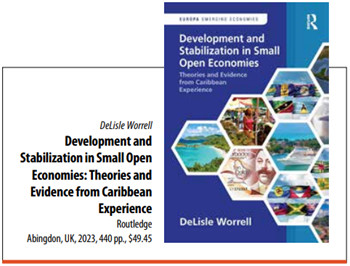This book makes a valuable contribution to the analysis of the economic problems facing small developing states, particularly in the Caribbean.
The analysis draws on the author’s decades of hands-on economic policy experience, both at the IMF and at the Central Bank of Barbados, where he served as governor from 2009 to 2017.
Worrell lays out why small states are different and what the implications are for economic policymaking. Small states are more open and hence exceptionally vulnerable to external shocks. With limited resources, they are forced to specialize in a few internationally competitive products and services. As a result, policies that seek to switch expenditures toward local products are usually not effective.
Another key factor is that in the Caribbean, prices that determine the competitiveness of local industries (tourism, mainly) are set not in local currency but in the currency of a much larger neighbor—the United States. This reduces the effectiveness of exchange rate devaluation or depreciation as a tool of economic adjustment. In the view of the author, small states are therefore best served by a pegged exchange rate. A fixed exchange rate regime helps contain inflation and lend credibility to the overall economic strategy. Other tools of macroeconomic policy—in particular, fiscal policy—can and must be used when the need for adjustment arises.
In Worrell’s view, if a small country is unable to establish a framework and track record for maintaining an exchange rate anchor, the best alternative is not a flexible exchange rate regime but abolishing local currencies altogether and simply adopting the dominant currency as legal tender—in the case of the Caribbean, the US dollar. This helps eliminate a potential source of instability, and of central bank financing for the government that could undermine fiscal discipline. Worrell thinks small Caribbean countries shouldright; follow in the footsteps of countries in the Americas that have decided to forgo their own currencies.
With limited or no monetary policy, fiscal policy takes center stage in economic policymaking. Small economies must get it right when it comes to tax policy and administration, expenditure and public wage policy, debt management, and the management of state-owned enterprises. Efficient delivery of public services is particularly important—and has been a struggle for the Caribbean. Budget allocations for health and education should be large enough to boost human development indicators, which would also raise international competitiveness. The bulk of consumption needs are imported, so fiscal policy that lacks prudence is bound to spill over into declining international reserves and eventually trigger a balance of payments crisis—a frequent occurrence in the Caribbean.
In Barbados, balance of payments crises in 1991 and 2018 both originated from fiscal policy failures. And both crises were successfully addressed by policies that centered on fiscal consolidation, while maintaining the exchange rate peg, in the context of an IMF-supported program. Worrell’s analysis of what worked and did not work in macroeconomic adjustment programs in the Caribbean offers plenty of food for thought.
Opinions expressed in articles and other materials are those of the authors; they do not necessarily reflect IMF policy.









